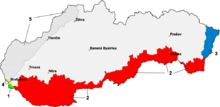Salzburg Conference
The radical branch was led by Vojtech Tuka and Alexander Mach, commander of the paramilitary Hlinka Guard, and was supported by Germany due to its acceptance of German dominion.
[8] The summit took place during a quiet spell in the war, shortly after the fall of France and while the defeat of the United Kingdom and victory of Nazi Germany appeared likely.
[9][10] Germany sought to use the favorable conditions to deepen its sphere of influence in the Danube region and force its allies in the area into a closer relationship.
He demanded that Tiso renounce his goal of a Catholic clerical state and dismiss Ďurčanský, due to the latter's "register of sins"—he had attempted to maintain communication with the Western powers and keep friendly relations with the Soviet Union.
[11][12] In another meeting, Adolf Hitler hinted that failure to comply would leave the Slovak State at the mercy of Hungary, by revoking the protection guarantees that Slovakia had obtained in the 1939 German–Slovak treaty.
[16] Specifically, they wanted six former districts to be returned to Slovakia: Vráble-Šurany, Lučenec, Jelšava, Košice, north Sátoraljaújhely and Sobrance District—3,600 square kilometres (1,400 sq mi).
[17] Jozef M. Kirschbaum [cs; sk], another Nástupist, was dismissed as Secretary-General of the Slovak People's Party, while Konštantín Čulen, the head of the Propaganda Ministry, was replaced by the radical Karol Murgaš.
[16] None of the Slovak leaders (except Mach) was happy with the result; Tuka had hoped to become president or defense minister and was ill-equipped to deal with the demands of the new offices he had obtained.
[1] As a reaction to the Salzburg talks, the Slovak People's Party embraced the Führerprinzip ("Führer principle"), putting Tiso in a position of complete authority and bypassing the German-mandated political changes.
[29] The previous German envoy Hans Bernard [de] was replaced[30] by Manfred von Killinger, a Sturmabteilung officer who described his purpose as making Slovakia "economically 100 per cent at [our] disposal".




